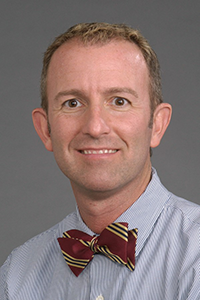Alumnus' book focuses on 'best practices, processes' by communities to prevent HIV
August 19, 2014

Dr. Scott Rhodes : “I really, really
love working with community-based organizations.”
A book about HIV prevention by Dr. Scott Rhodes spotlights the effectiveness of community involvement to reduce HIV infections in the United States.
Rhodes, an Arnold School of Public Health alumnus, is the editor of “Innovations in HIV Prevention Research and Practice through Community Engagement.” It is a reminder of the fear that began in 1981 when the first cases of HIV/AIDS were written about in the June 5, 1981, issue of the U.S. Centers for Disease Control and Prevention's Morbidity and Mortality Weekly Report. Before long, doctors, health care professionals, researchers and public health practitioners raced against time to find a way to curb the number of deaths that began with HIV (Human Immunodeficiency Virus) and progressed to what became known as AIDS (Acquired Immunodeficiency Syndrome).
But Rhodes’ book goes beyond those years and is a comprehensive collection of the “best practices and processes” taking place in communities throughout the United States that have been vital to the prevention of HIV. Published by Springer, the book has 264 pages.
The book comprises a variety of successful programs that affect African American rural communities, Native Americans, adolescents living with HIV, faith communities and communities disproportionately affected by HIV/AIDS, and much more.
“The chapters are written by researchers whose successful interventions are community focused. The book will provide readers with an understanding of how community engagement can be effective,” he said. “Community engagement is hard. The book examines the work that is being done and provides information on successes and challenges.”
A professor in the Division of Public Health Sciences at Wake Forest School of Medicine, Rhodes said, “I really, really love working with community-based organizations and local citizens and bringing people together to develop programs that are meaningful.”
The HIV/AIDS crisis was in its 10th year when Rhodes earned his master’s degree from the Arnold School’s Department of Health Administration, now the Department of Health Services and Policy. He selected the Arnold School because “there was terrific work going on in HIV/AIDS education and prevention.”
He credits then Arnold School researchers Dr. Donna Richter, Dr. Francisco Sy and the late Dr. Michael Samuels for their mentorship. “I chose the Arnold School because of the strong research that was going on at that time and the reputation of the school.”
After earning his master’s degree, Rhodes entered the Peace Corps and served in Guatemala for three years. He worked as a health educator at the Richland County Health Department before seeking his doctoral degree from the University of Alabama, Birmingham.
His life’s work has been devoted to helping communities learn how to develop partnerships that will protect the health of people living there. His research has been supported by the National Institutes of Health and the Centers for Disease Control and Prevention.
“A career in public health is an opportunity to blend activism with science. Public health enables researchers and practitioners the chance to make a difference every day. We know what we do is making a difference,” Rhodes said.
Visit http://www.amazon.com/s/ref=nb_sb_noss_2?url=search-alias%3Dstripbooks&field-keywords=Innovations%20in%20HIV%20Prevention%20Research%20and%20Practice%20through%20Community%20Engagement to read more about the book on Amazon.



_01.jpg)
_02.jpg)